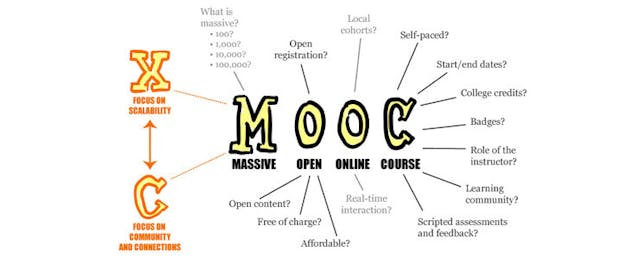The debates are just beginning to boil. Last week, Georgia Tech plunged into the ether by announcing it will award a Master's degree in Computer Science to students who go through its program with Udacity.
Faculty around the U.S. are raising plenty of questions about what such programs will mean for them, their institutions and their students:
- From the philosophy department at San Jose State University to Harvard professor, Michael Sandel, whose course, JusticeX, is offered via edX: "There is no pedagogical problem in our department that JusticeX solves, nor do we have a shortage of faculty capable of teaching an equivalent course." And the response from Professor Sandel: "The last thing I want is for my online lecture to be used to undermine faculty colleagues at other institutions." (A full piece from the Chronicle of Higher Education here.)
- The Amherst faculty voted in April against joining edX, 70 to 36 (with five abstentions).
- Duke nixed a deal with online provider, 2U in April as well.
Dip a toe in the blogosphere and you will find plenty of thoughtful debate:
-
"At the moment, the classism of the MOOCs is most clear in the central unexamined assumption--that the “best” teachers are at the “best” universities. Now, it is true that the most prominent scholars tend to teach at the most prominent universities, but the skills of teaching are widely distributed--and the difficult job market of the last thirty years has ensured that there are outstanding scholars at many colleges and universities around the country. Indeed, those who teach students who arrive at college or university with less preparation have often spent more time honing their pedagogical skills in order to engage their students and address the challenges that their diverse backgrounds, socio-economic levels, and intellectual strengths present." (From: "Who’s really for change, and who in fact is standing athwart history yelling STOP?")
- "Most of the MOOC phenomenon, like much of the distance learning that preceded it, is based on a straight instructional model: open up student’s head, pour in information, then test for absorption. It is a model that, as a graduate student in education, I had figured was completely debunked; we know so much more about how people encounter information, how minds work, how learning issocial and situated and practical and distributed and constructionist and connectivist...You want to see a real MOOC? Look at the Internet itself. What I consider to be the greatest educational achievement of our time is how society has rallied around the open web to create a whole new set of literacies, making learning opportunities for millions of people who are motivated simply to make the network work." (From: "MOOCs, Big Data and the Open Web")
And a very thoughtful, 28-page exploration by Sir John Daniel published in September 2012 entitled: "MOOCs Making Sense of Musings in a Maze of Myth, Paradox and Possibility" in which he notes:
- "A first myth is that university brand is a surrogate for teaching quality. It isn’t. The so-called elite universities that are rushing into xMOOCs gained their reputations in research. Nothing suggests that they are particularly talented in teaching, especially teaching online...We also agree with Bates that current xMOOCs pedagogy is pretty old hat but this will now change fast. Even if Coursera gave its partner universities great freedom in course formats in order to sugar the pill of signing the contract, this will quickly produce a great diversity of approaches and much healthy experimentation. By the end of 2012 various actors from the media through student groups to educational research units will be publishing assessments of xMOOC courses. These will quickly be consolidated into league tables that rank the courses--and the participating universities--by the quality of their offerings as perceived by both learners and educational professionals...This, in turn, will put a focus on teaching and pedagogy to which these institutions are unaccustomed, which will be healthy." (MFrom: "MOOCs Making Sense of Musings in a Maze of Myth, Paradox and Possibility")
This is hardly a comprehensive survey of the debate. Two EdSurge contributors weigh in this week, too: Joshua Kim of Dartmouth hopes that MOOCs will add momentum to efforts to improve teaching. Cathy N. Davidson of Duke aims to teach a MOOC about universities, with the goal of fostering more dialogue.
How about you? Weigh in--below or directly to us. As we said, the debate is just beginning.


